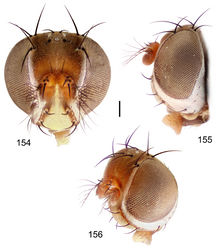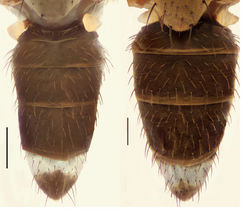Hydrochasma capsum
| Notice: | This page is derived from the original publication listed below, whose author(s) should always be credited. Further contributors may edit and improve the content of this page and, consequently, need to be credited as well (see page history). Any assessment of factual correctness requires a careful review of the original article as well as of subsequent contributions.
If you are uncertain whether your planned contribution is correct or not, we suggest that you use the associated discussion page instead of editing the page directly. This page should be cited as follows (rationale):
Citation formats to copy and paste
BibTeX: @article{Mathis2013ZooKeys363, RIS/ Endnote: TY - JOUR Wikipedia/ Citizendium: <ref name="Mathis2013ZooKeys363">{{Citation See also the citation download page at the journal. |
Ordo: Diptera
Familia: Ephydridae
Genus: Hydrochasma
Name
Hydrochasma capsum Mathis & Zatwarnicki, 2013 sp. n. – Wikispecies link – ZooBank link – Pensoft Profile
Diagnosis
This species is distinguished from other congeners by the following combination of characters: Small to moderately small shore flies, body length 1.25–2.15 mm. Head: Antenna mostly dark gray; parafacial silvery white, concolorous with facial coloration; gena-to-eye ratio 0.16–0.17. Thorax: Wing with costal vein ratio 0.68–0.71; M vein ratio 0.60–0.62. Forecoxa mostly to entirely yellow, at most with basal margin gray to silvery gray. Abdomen: Tergites 1–4 with dorsum extensively grayish black to slate black, sharply contrasted along an even line with gray to silvery gray lateral margins (margins sometimes on venter), lacking gray wedges along lateral margins; tergite 5 of male with gray anterior margin, posterior portion with a large, medial, oval, black spot (Fig. 184). Male terminalia (Figs 157–160): Combined structures generally moderately elongate, in posterior view (Fig. 157) height slightly more than twice width, generally setulose but with setulae on ventral 1/3 smaller than those on dorsal 2/3; epandrium with dorsal arch above cerci roundly truncated, not connected, in posterior view (Fig. 157) with wide medial area membranous, narrowest at midlength, sclerotized ventral portion (along margin) tapered to sharp point, ventral margin very broadly rounded, in lateral view (Fig. 158) with posterior margin more or less evenly curved, anterior margin with a shallow protuberance at ventral 1/3; cerci moderately long, height nearly twice width, narrowly semi-hemispherical (Fig. 157), not attached lateroventrally with epandrium; aedeagus in lateral view (Fig. 160) complex, robust, moderately deeply bilobed, base wide, width just slightly less than length of gonite, anterior lobe narrow, bearing hairs on apicoposterior margin, posterior lobe wider, membranous, in ventral view (Fig. 159) relatively narrow on basal 1/3, thereafter slighter wider, apex broadly rounded; phallapodeme in lateral view (Fig. 160) elongate, narrow, rod-like, mostly parallel sided, apex at hypandrial end, widened, in ventral view (Fig. 159) an elongate, T-shaped process with width of crossbar about 1/3 length, vertical portion parallel sided, straight; gonite in lateral view (Fig. 160) narrow, elongate, bar-like, with shallow zigzag medially, in ventral view (Fig. 159) bar-like, slightly sinuous; hypandrium in lateral view (Fig. 160) pointed anteriorly, becoming wider posteriorly, in ventral view (Fig. 159) robustly W-shaped with medioanterior cleft short, depth less than crossbar of phallapodeme, each lateral portion wide, robustly developed, posterior emargination widely V-shaped.
Type material
The holotype male of Hydrochasma capsum is labeled “ECUADOR. Prt.Or[e]ll[a]na: RíoTiputini (0°38.2'S, 76°8.9'W)[,] 12–26Aug 1999, W. N. Mathis, A. Baptista, M. Kotrba/USNM ENT 00117968 [plastic bar code label]/HOLOTYPE ♂ Hydrochasma capsum Mathis & Zatwarnicki, USNM [red].” The holotype is double mounted (minuten in a block of plastic), is in excellent condition, and is deposited in the USNM. Sixty-three paratypes (58♂, 5♀; USNM) bear the same label data as the holotype.
Type locality
Ecuador. Orellana: RíoTiputini (0°38.2'S, 76°8.9'W).
Other specimens examined
Neotropical. BOLIVIA. La Paz: Guanay (3 km E; 15°30.2'S, 67°52.3'W; 500 m), 14 Mar 2001, W. N. Mathis (3♂; USNM); Mapiri (15°18.6'S, 68°13'W; 720 m), 15–17 Mar 2001; S. D. Gaimari, W. N. Mathis (1♀; USNM).
BRAZIL. Paraná: Matinhos (N.; 25°46.4'S, 48°30.8'W; 3 m; beach/estuary), 25 Mar 2010, D. and W. N. Mathis (1♂; DZUP, USNM). São Paulo: Ubatuba, Praia Puruba (23°21'S, 44°55.6'W; beach), 29–30 Mar 2010, D. and W. N. Mathis (18♂, 2♀; USNM).
COSTA RICA. Cartago: Pejibaye (09°48.1'N, 83°42.7'W; La Reserva Biológica del Copal; 1090 m), 4 Apr 2005, J. Azofeifa, D. Briceño (2♂, 8♀; INBio). Guanacaste: Bagaces Fortuna Z.P. Miravalles (10°43.1'N, 84°51.3'W; Sendero Cabro Muco; 980 m), 8–31 Jul 2002, J. D. Gutierrez (2♂, 3♀; INBio); Parque Nacional Santa Rosa (Bosque San Emilio; 10°50.6'N, 85°36.8'W; 300 m), 12–14 Jun 2002, D. Briceño (1♂; INBio).
ECUADOR. Pastaza: Puyo (01°29'S, 77°59.7'W; black light), 16 May 1977, D. R. Givens, P. J. Spangler (54♂, 29♀; USNM).
GUYANA. Conservation of Ecological Interactions and Biotic Associations (CEIBA; ca. 40 km S Georgetown; 06°29.9'N, 58°13.1'W), 13–21 Apr 1994, 1995, 1997, W. N. Mathis (7♂; USNM); Georgetown (06°48.6'N, 58°08.6'W), 20–29 Aug 1997, W. N. Mathis (2♀; USNM); Karanambo, Rupununi River (ox bow; 03°45.1'N, 59°18.6'W), 2 Apr 1994, W. N. Mathis (1♂, 1♀; USNM); Kato, Chiung River (04°39.7'N, 59°50.0'W), 1 May 1995, W. N. Mathis (5♂, 5♀; USNM); Kumu River and Falls (25 km SE Lethem in Kanuku Mountains; 03°15.9'N, 59°43.6'W), 4–30 Apr 1994, 1995, W. N. Mathis (4♂, 3♀; USNM); Wiruni River (05°46.6'N, 58°01'W), 11 Apr 1994, W. N. Mathis (1♂, 4♀; USNM).
TRINIDAD and TOBAGO. Tobago. St. John: Charlotteville (5 km S; Hermitage River and beach; 11°18.9'N, 60°34.2'W), 10 Jun 1993, D. and W. N. Mathis (1♂; USNM).
West Indies. CUBA. Cienfuegos: Topes de Collantes (5 km WNW; 21°56.5'N, 80°2.3'W; 600 m), 11 Dec 1994, W. N. Mathis (1♂, 2♀; USNM). Pinar del Rio: Soroa (22°47.7'N, 83°W), 27–28 Apr 1983, W. N. Mathis (1♂; USNM). Sancti Spiritus: Topes de Collantes (21°54.4'N, 80°01.4'W; 670 m), 9–11 Dec 1994, W. N. Mathis (4♂, 14♀; USNM).
DOMINICAN REPUBLIC. Barahona: Baoruco (beach and river; 18°04.6'N, 71°05.5'W), 19 May 1998, D. and W. N. Mathis (6♂; USNM); Paraíso (5 km N; 18°01.5'N, 71°11.6'W; 150 m), 21 Mar 1999, W. N. Mathis (1♂; USNM); San Rafael (18°01.9'N, 71°08.4'W), 22 Mar 1999, W. N. Mathis (1♂; USNM). El Seibo: Pedro Sáchez (18°51.4'N, 69°6.5'W), 26 May 1998, D. and W. N. Mathis (1♂; USNM). Independencia: Duvergé (2 km S; 18°22'N, 71°31.4'W), 24 Mar 1999, D. and W. N. Mathis (5♂, 1♀; USNM); Puerto Escondido (18°19.6'N, 71°35'W; 1370 m), 24 Mar 1999, D. and W. N. Mathis (1♂; USNM). La Vega: El Rio (9.5 km E; 19°0.9'N, 70°33.5'W; 980 m), 6–24 May 1995, 1998, D. and W. N. Mathis (16♂, 3♀; USNM); Constanza (15.2 km SE; 18°60.3'N, 70°40.9'W; 1580 m), 7 May 1995, W. N. Mathis (1♂; USNM); Jarabacoa (1–2 km S; 19°06.9'N, 70°37'W; 520 m), 8–21 May 1995, 1998, D. and W. N. Mathis (3♂, 4♀; USNM); La Cienega de Manabao (19°03.9'N, 70°51.8'W; 1050 m), 28 Mar 1999, W. N. Mathis (14♂, 5♀; USNM); Jarabacoa (5 km S; 19°05.8'N, 70°36.5'W; 640 m), 8–20 May 1995, W. N. Mathis (1♀; USNM); Río Camu (3.5 km NW La Vega; 19°13.8'N, 70°35.2'W; 100 m), 18 May 1998, D. and W. N. Mathis (1♂, 1♀; USNM); Salto Baiguate (near Jarabacoa; 19°05.5'N, 70°36.9'W; 570 m), 9 May 1995, W. N. Mathis (8♂, 2♀; USNM); Salto Guasara (near Jarabacoa; 19°04.4'N, 70°42.1'W; 680 m), 9 May 1995, W. N. Mathis (4♂; USNM). Monseñor Nouel: near Jima (19°01.6'N, 70°28.8'W; 670 m), 24 May 1998, D. and W. N. Mathis (2♂; USNM). Pedernales: Alcoa Road (km 30; N Cabo Rojo; 18°07.3'N, 71°35.8'W; 1080 m), 20 Mar 1999, W. N. Mathis (1♂, 1♀; USNM); Pedernales (19 km N; 18°09.2'N, 71°44.8'W; 230 m), 20 Mar 1999, W. N. Mathis (4♂; USNM). Puerto Plata: Río Camu (14 km E Puerto Plata; 19°41.9'N, 70°37.4'W), 17–23 May 1995, 1998, D. and W. N. Mathis (6♂; USNM).
JAMAICA. Clarendon: Grantham (18°09.3'N, 77°23.8'W; 340 m), 16 Apr 2000, W. N. Mathis (3♂, 2♀; USNM). Manchester: Mandeville (18°03.5'N, 77°31.9'W), 7–13 May 1996, D. and W. N. Mathis, H. B. Williams (2♂, 2♀; USNM). Portland: Crystal Springs (18°12.5'N, 76°37.9'W), 18 May 1996, D. and W. N. Mathis, H. B. Williams (1♂, 1♀; USNM); Berridale (18°06.5'N, 76°20'W), Rio Grande River, 25 Apr 2000, W. N. Mathis (4♂, 1♀; USNM); Green Hills (18°05.7'N, 76°43'W; 780 m), 28 Apr 2000, W. N. Mathis (1♂; USNM). St. Andrew: Mavis Bank (1.7 km E; 18°02.4'N, 77°39.5'W; 575 m), Yallahs River, 21–22 Apr-1 May 2000, W. N. Mathis (7♂, 7♀; USNM); Mavis Bank (4.3 km SE; 18°01.4'N, 76°38.1'W; 480 m); Yallahs River, 22–23 Apr 2000, W. N. Mathis (3♂, 1♀; USNM); Mavis Bank (near coffee factory; 18°01.4'N, 76°39.7'W; waterfall), 21–23 Apr 2000, W. N. Mathis (1♂, 2♀; USNM); Silver Hill Gap (18°05.3'N, 76°43'W; 940 m), 29 Apr 2000, W. N. Mathis (1♂; USNM). St. Elizabeth: Ys Falls (18°09.3'N, 77°49.5'W), 17–18 Apr 2000, W. N. Mathis (7♂, 5♀; USNM). St. Mary:Annotto Bay (marsh), 25 Feb 1969, W. W. Wirth (2♂, 1♀; USNM). St. Thomas: Bath Fountain Spring (17°57.6'N, 76°21.3'W), 15 May 1996, D. and W. N. Mathis, H. B. Williams (2♂, 1♀; USNM); Bath River, Bath (17°56.8'N, 76°21.6'W), 16 May 1996, D. and W. N. Mathis, H. B. Williams (2♂; USNM); Hagley Gap (1 km E; 18°00.1'N, 76°36.7'W), 16 May 1996, D. and W. N. Mathis, H. B. Williams (2♂, 1♀; USNM); Mt. Lebanus (17°58.2'N, 76°32.7'W), 16 May 1996, D. and W. N. Mathis, H. B. Williams (2♂; USNM); Yallahs River (mouth; 17°53'N, 76°35.6'W), 14 May 1996, D. and W. N. Mathis, H. B. Williams (4♂, 2♀; USNM).
PUERTO RICO. Maricao (18°11.1'N, 66°58.9'W), 21 Sep 1995, D. and W. N. Mathis (9♂, 7♀; USNM); Maricao, Los Viveros (18°10.5'N, 66°59.2'W), 21 Sep 1995, D. and W. N. Mathis (1♂; USNM); Río Hoconuco (18°7.6'N, 67°2.6'W), 20 Sep 1995, D. and W. N. Mathis (6♂, 1♀; USNM).
ST. LUCIA. Dauphin Boguis (1.6 km S Marquis; 14°01'N, 60°55'W), 17 Jun 1991, D. and W. N. Mathis (1♂, 1♀; USNM).
Distribution
(Fig. 161). Neotropical: Bolivia (La Paz), Brazil (Paraná, São Paulo), Costa Rica (Cartago, Guanacaste), Ecuador (Orellana, Pastaza), Guyana, Trinidad and Tobago, West Indies (Cuba, Dominican Republic, Jamaica, Puerto Rico, St. Lucia).
Etymology
The species epithet, capsum, is of Latin derivation and means case, referring to the rectangular, case-like shape of the male terminalia in posterior view.
Remarks
This species is closely related to Hydrochasma robustum, especially the similar shapes of their respective epandriums in posterior view, but it can be distinguished from that species by the more broadly developed hypandrium in ventral view (wider than long) and the lack of basal, hypandrial notches.
Original Description
- Mathis, W; Zatwarnicki, T; 2013: A revision of the shore-fly genus Hydrochasma Hendel (Diptera, Ephydridae) ZooKeys, 363: 1-161. doi
Images
|

![Figures 157–160. Hydrochasma capsum sp. n. (Puerto Rico. Rio Hoconuco) 157 epandrium and cerci, posterior view 158 same, lateral view 159 internal structures of male terminalia (aedeagus [shaded], phallapodeme, gonite, hypandrium), ventral view 160 same, lateral view. Scale bar = 0.1 mm.](https://species-id.net/o/thumb.php?f=ZooKeys-363-001-g061.jpg&width=177)

